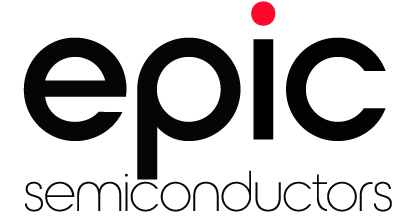Home » EPIC Semiconductors Shares IP Strategy Tips for Disruptive Technology
EPIC Semiconductors Shares IP Strategy Tips for Disruptive Technology

"Patents substantiate a technology's competitive advantage! IP ownership is extremely important"
-Linda Zadeh, CEO EPIC Semiconductors
EPIC Semiconductors has developed a disruptive "nanoCloud" technology - an integrated energy harvesting, AI-enabled chips that do not require batteries or any external power sources. Based on "electron entanglement", a dynamic form of capacitive coupling between surfaces, self-learning dust-sized integrated circuits bridge air-distance without the need for RF, magnetic, or antennas to communicate with each other and with gateway standards, which allows these circuits to be utilized in wet environments.The potential applications for this technology are limitless. For example, EPIC's integrated circuits could perform in medical applications such as on balloon catheters, or enable supply chain traceability, and will surely be used for numerous other applications that even Linda Zadeh, EPIC Semiconductors' founder and CEO, hasn't envisioned yet. I recently had the opportunity to speak with Lisa about the company's IP.
When EPIC first started licencing their products to customers, they thought they had to patent every application in order to protect their technology. Linda soon realized that this would require an enormous budget. She then shifted to filing broad basic patents focused on the core technology only, explaining that "patenting a technology is different than patenting a product...it's good because no one can attack you since you have in your had a completely new technology that has the potential to change the world."
Linda acknowledges that this strategy isn't available to all inventors, especially in crowded technological landscapes, but as EPIC Semiconductors has developed disruptive technology that is poised to upend existing markets, the approach allowed Linda to protect EPIC's core IP on a smaller budget, particularly in the company's early days.
This strategy has provided the added benefit of clarifying IP ownership. Linda explains that one of the first questions her customers ask is "Who owns the IP? Is there a competitor here?" As EPIC owns the core IP, customers can be sure that they don't have to worry about their freedom to operate when they licence its IP or buy EPIC products; and thus, they're not exposed to infringement risk. This approach also protects the company, as customers who patent a product that builds on the company's IP must obtain a licence in order to make, use and sell their product. Keeping the IP ownership "pure" is also one of the reasons Linda shies away from the IP co-development and co-ownership whose benefits, in her opinion, are not worth the risk and complexity.
In order to make the patenting process simpler and more streamlined for startups working in deep tech, Linda recommends having an in-house patent agent with a background in the relevant tech. This makes it easier for the patent agent to keep up with technological developments taking place on a day to day basis, streamlines the process of getting ideas into a patent application - which Linda cautions have a vocabulary of their own - and also puts an additional set of knowledgable eyes on the technology, which can be very useful at times as the patent agent may have ideas for improving not only a patent application but also the tech itself. Linda mentioned that she's had several spirited discussions with her in-house patent agent about the best way to protect her technology, and that these discussions, through challenging always result in a better IP strategy in the end. Linda explains that EPIC's in-house patent agent brings "great support and really good ideas" to the table.
EPIC's patenting strategy is to use regular patent applications as opposed to using provisional or international patent applications (aka PCTs). Linda recognizes that many startups favour these alternatives since they allow them to delay jurisdiction selection and provide more time to seek out financing. PCTs are, she acknowledges, effective ways to achieve these goals. However, she prefers regular patent applications as their use forces the company to think very strategically about the markets they want to enter, as the company must figure out exactly what is most critical to protect in each market, both for the company and its target clients for each product. This also helps them control patent filling costs, which can quickly balloon when the time comes to enter the national phase following a PCT filing.Linda also appreciates that this approach allows the company to focus on the next patentable innovation without having to worry as much about critical patenting timelines. One additional technique Linda has used to obtain patent protection quickly is to first file in a region such as Singapore, where patent applications are often examined within six months of filing.
Linda also offers the tip that patent examiners from all jurisdictions are usually quite friendly, and says they're often willing to offer suggestions for changes that can sometimes help move patent prosecution forward. "Don't be shy to reach out to them", she advises, "because they really want to help".
Linda highlights that inventions need to be well protected from the outset, and that strategies such as sharing information on a need to know basis, even internally within the company, can be very helping in protecting not-yet-patented innovations and know-hows that form the basis of trade secrets. This is particularly important in a company's early days when founders and employees are still learning about IP protection and figuring out what their patenting vs trade secret strategy will look like. Maintaining trade secrets offers the company more time to flesh out their patenting strategy without losing the ability to protect important innovations.
EPIC Semiconductors now has over 20 granted patents covering their core technologies. Their strategy of seeking the broadest possible patent protection for their tech combined with their careful selection of important markets has allowed them to implement an IP strategy that provides them with robust protection at a reasonable cost.
If you'd like to learn more about IP in order to make the most of your startup's innovative tech, check out ventureLAB's IP blog series. ventureLAB clients and alumni also have access to free IP Strategy development support - you can reach out to me at [email protected] to find out more.
About EPIC Semiconductors
EPIC Semiconductors, Inc. is a fabless technology provider with a strong commitment to the development of disruptive innovations and sustainable technologies.
About Josée Pharand
Josée is passionate about intellectual property and loves helping founders protect their IP. Before joining ventureLAB she served as a Director for Canada’s Innovation Superclusters Initiative and was responsible for the program’s intellectual property framework. Josée has a Bachelor’s of Applied Science in Mechanical Engineering and spent several years in the private sector before joining the Canadian Intellectual Property Office (CIPO), where she found her true passion in intellectual property and innovation. Highlights of her thirteen years at CIPO include representing the Government of Canada in negotiations on international patent harmonization and working to implement the Patent Law Treaty.
About ventureLAB
ventureLAB is a leading global founder community for hardware technology and enterprise software companies in Canada. Located at the heart of Ontario’s innovation corridor in York Region, ventureLAB is part of one of the biggest and most diverse tech communities in Canada. Our initiatives focused on raising capital, talent retention, commercializing technology and IP, and customer acquisition have enabled thousands of companies to create over 4,500 jobs and raise more than $250 million in investment capital. At ventureLAB, we grow globally competitive tech titans that build-to-scale in Canada, for global markets.
VentureLAB
https://www.venturelab.ca/
ventureLAB is a leading global founder community for hardware technology and enterprise software companies in Canada. Our organization is led by seasoned entrepreneurs and business leaders with decades of industry experience in building IP-rich start-ups, scale-ups, and global multinationals to help you scale your business. Located at the heart of Ontario’s innovation corridor in York Region, ventureLAB is part of one of the biggest and most diverse tech communities in Canada. We enable technology startups to accelerate the commercialization of transformational products on a global scale.


